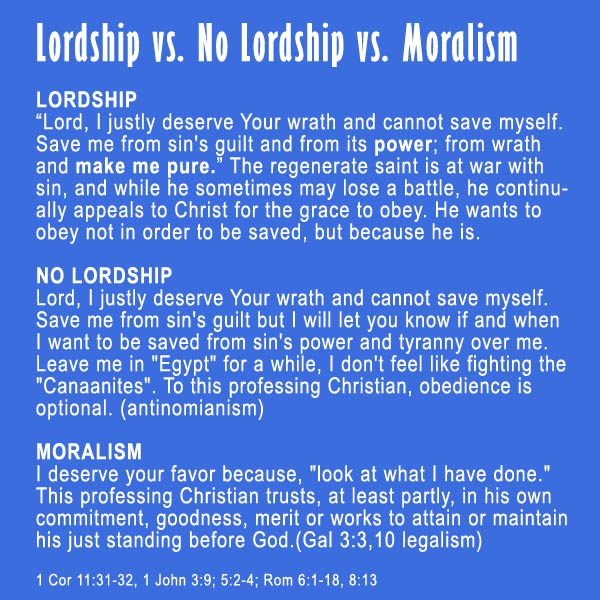 Article by John Hendryx (original source here)
Article by John Hendryx (original source here)
I have read some critical remarks of Lordship salvation which have some validity. These criticisms have indeed been true with some erroneous presentations of Lordship that appear to be nothing more than a works-based based gospel which give the impression that salvation, at least partly, has to do with our commitment every bit as much as Christ’s cross. However, just like any doctrine, things tend to go awry when humans are involved… but if understood rightly, biblically I believe that it actually conforms to the Reformed confessions and, more importantly, to the Bible’s central message of salvation by grace alone in Christ alone. Because of this I wish to write a very short piece to bring some clarity to the issue.
What is Lordship?
When the Holy Spirit touches or quickens a person’s heart, they recognize immediately that because of their sinful rebellion against a Holy God, that they justly deserve the His wrath and know sin to be their greatest burden and enemy. Yet being in captivity and bondage to it, they despair of all hope in their flesh (Phil 3:3), knowing there is nothing they can do to save themselves. So they appeal to Christ Jesus as their only hope to deliver them from both the guilt and power of sin. They know only He can save them from God’s wrath and sin’s captivity. That is why he is called the Savior.
The sinner whom the Spirit applies Christ’s redemption does not say, “Jesus, forgive my sin but leave me in the grip of its power.” That is a sure sign of a spurious conversion. No, a regenerate person who is united to Christ wants to be rid of that which breaks God’s heart but know he is utterly helpless in himself to free himself. He knows Jesus alone has the power to free the captives. By the very calling on Jesus to deliver him from sin’s tyranny, the quickened man reveals a renewed heart that no longer has allegiance to sin, but to Christ. Sin is no longer Lord, Jesus is Lord! In fact he will continually come to God in prayer knowing he has no strength in himself to fight sin, but appeals to Jesus to deliver him from it.
If a person simply wants their guilt removed so they can escape from hell but does not want to be rid of the sin which is what put them there in the first place, and this is the pattern of their life, it reveals an uncircumcised heart (Deut 29:4).
The regenerate believer, who a new heart, loves God so will fight against sin and mourn over the breaking of God’s law for the rest of his life (Deut 30:6). He will stumble, and know himself to daily woefully fall short of God’s holy standard, but will never fall away altogether (Psalm 37:24) for the Spirit works in him a desire to confess sin and do that which is pleasing to God. (1 Cor 11:31-32) It is not the perfection of his life which determines that he yields to Christ as Lord, but the Spirit driven direction of his life. He trusts in Christ alone for his standing before God and trusts in Christ alone to enable him to fight sin. Jesus has conscripted you in His army against it, first in your own heart and then in the world.
So, in short, Lordship salvation is not our commitment that saves us but Christ who grants me a renewed heart which wants to be delivered from sin in all its forms. Where people tend to go wrong on this issue is when they have a low view of the work of the Holy Spirit in regeneration on the one hand (no Lordship,antinomianism) or too high a view of the fallen sinners native ability to follow Christ (Moralism, Legalism).
The opposite of “easy believism” is not “hard believism” but “impossible believism” (1 Cor 12:3, 1 Cor 2:14). But thanks be to God, “what is impossible with man is possible with God.”(Luke 18:27) A regenerate man recognizes his own spiritual impotence but also that the power of the resurrected Christ in him gives him the the only resource to overcome sin.
“…this is the love of God, that we keep his commandments. And his commandments are not burdensome. 4 For everyone who has been born of God overcomes the world. And this is the victory that has overcome the world—our faith. 5 Who is it that overcomes the world except the one who believes that Jesus is the Son of God?” 1 John 5:2-4
It is not our faith or personal effort that overcomes sin but the LORD of our faith — the One whom we put our faith in who has all power, who has united us to Himself, that overcomes sin. We contribute nothing to our salvation. Obedience flows from the cross (always), and it does not contribute to it … It is a fruit of our union with Christ not the root. Nothing we do could remotely shine a candle to the “Sun” of God’s righteousness in Christ … nothing we could do to earn, attain or maintain our standing before God. That is Christ’s office and His alone. He has done it all.
Lordship vs. No Lordship vs. Moralism
LORDSHIP
“Lord, I justly deserve Your wrath and cannot save myself. Save me from sin’s guilt and from its power; from wrath and make me pure.” The regenerate saint is at war with sin, and while he sometimes may lose a battle, he continually appeals to Christ for the grace to obey. He wants to obey not in order to be saved, but because he is.
NO LORDSHIP
Lord, I justly deserve Your wrath and cannot save myself. Save me from sin’s guilt but I will let you know if and when I want to be saved from sin’s power and tyranny over me. Leave me in “Egypt” for a while, I don’t feel like fighting the “Canaanites”. To this professing Christian, obedience is optional. (antinomianism)
MORALISM
At one time I deserved your wrath but now I deserve your favor because, “look at what I have done.” This professing Christian trusts, at least partly, in his own righteousness, commitment, goodness, merit or works or attain or maintain his just standing before God.(Gal 3:3. 10, legalism) Of course, if they have a high view of God’s holiness, this person will fail over and over and fall into despair because they are not relying on God’s grace and God’s power, but continually attempt to do it in their own strength.
1 Cor 11:31-32, 1 John 3:9; 5:2-4; Rom 6:1-18, 8:13
Note: I realize that most “no-Lordship” people would probably not pray this exact prayer. If is meant for effect because this is what their theology is saying and what I often hear in debates online. It is meant to reveal an inconsistency in their theology in the hope that they will see the folly of such a position.

